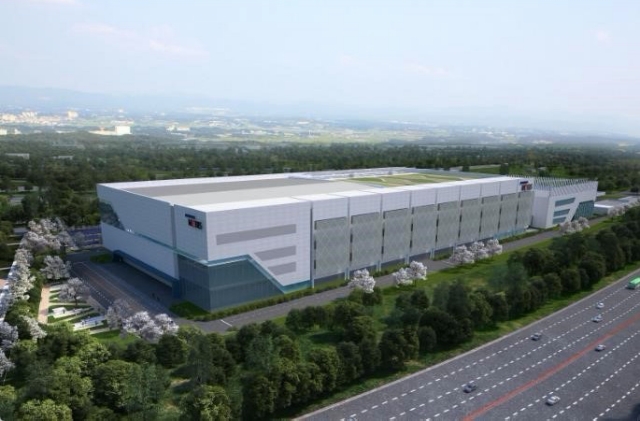Hyundai Mobis will be spending ₩1.3 trillion or about $1.09 billion to construct two hydrogen fuel cell plants in South Korea. The Korean car parts company announced its plans during the groundbreaking ceremony for one of the two buildings on Thursday, Oct. 7.
The event took place in Incheon at the Cheongna International City’s industrial complex. The Korea Herald reported that S. Korea’s President Moon Jae In attended the ceremony along with Deputy Prime Minister Hong Nam Ki.
The new Hyundai Mobis facilities are set to begin their operation within the second half of 2023. Once running, these are expected to produce 100,000 hydrogen fuel cells per year. The company will add this volume to the 23,000 that are being made yearly at the Chungju factory since 2018.
Moreover, the company’s number of fuel cell plants will increase to three once the constructions are completed in the second half of 2022. The combined power of the three facilities will strengthen Hyundai Mobi’s fuel cell system supply chain around the country.
At any rate, the soon-to-rise Cheongna plants will be dedicated to the production of fuel cell stacks that generate electricity through the hydrogen and oxygen chemical reaction. These will be used in fuel cell electric vehicles (FCEV) that Hyundai Motor is developing to replace gas-powered cars. On the other hand, the plant in Ulsan has been designated to pack and assemble the manufactured stacks into systems with other components.
Furthermore, Hyundai Mobis has plans to make use of its facilities in Ulsan and Incheon to develop more kinds of fuel cell stacks that can be fitted in types of vehicles, including heavy machines like forklifts and excavators, as per The Korea Times.
Cho Sung Hwan, Hyundai Mobis’ chief executive officer, promised to continue investing in bolstering their R&D capability in the hydrogen industry and more. He also said that they would keep working to become a global leader in their line of business.
“Despite uncertainties including COVID-19, we have decided to make this large-scale investment to secure the market-leading competitiveness in the global fuel cell industry,” the CEO said via press release. “We will continue to invest more in facilities and strengthen our R&D capability for the development of the hydrogen industry and expand the ecosystem.”



 U.S. Stocks Rally as Nvidia Earnings Loom, Oil Prices Near Seven-Month Highs
U.S. Stocks Rally as Nvidia Earnings Loom, Oil Prices Near Seven-Month Highs  FedEx Faces Class Action Lawsuit Over Tariff Refunds After Supreme Court Ruling
FedEx Faces Class Action Lawsuit Over Tariff Refunds After Supreme Court Ruling  U.S.-Canada Trade Talks Resume as Trump Administration Reviews USMCA
U.S.-Canada Trade Talks Resume as Trump Administration Reviews USMCA  Venezuela Oil Exports to Reach $2 Billion Under U.S.-Led Supply Agreement
Venezuela Oil Exports to Reach $2 Billion Under U.S.-Led Supply Agreement  Germany and China Reaffirm Open Trade and Strategic Partnership in Landmark Beijing Visit
Germany and China Reaffirm Open Trade and Strategic Partnership in Landmark Beijing Visit  Panama Investigates CK Hutchison’s Port Unit After Court Voids Canal Contracts
Panama Investigates CK Hutchison’s Port Unit After Court Voids Canal Contracts  APEX Tech Acquisition Inc. Raises $111.97 Million in NYSE IPO Under Ticker TRADU
APEX Tech Acquisition Inc. Raises $111.97 Million in NYSE IPO Under Ticker TRADU  U.S. Stock Futures Fall as Nvidia Drops Despite Strong Earnings; Netflix Jumps 9%
U.S. Stock Futures Fall as Nvidia Drops Despite Strong Earnings; Netflix Jumps 9%  USITC to Review Impact of Revoking China’s PNTR Status, Potentially Raising Tariffs on Chinese Imports
USITC to Review Impact of Revoking China’s PNTR Status, Potentially Raising Tariffs on Chinese Imports  China’s New Home Prices Post Sharpest Drop Since 2022 Amid Ongoing Property Slump
China’s New Home Prices Post Sharpest Drop Since 2022 Amid Ongoing Property Slump  Anthropic Refuses Pentagon Request to Remove AI Safeguards Amid Defense Contract Dispute
Anthropic Refuses Pentagon Request to Remove AI Safeguards Amid Defense Contract Dispute  Snowflake Forecasts Strong Fiscal 2027 Revenue Growth as Enterprise AI Demand Surges
Snowflake Forecasts Strong Fiscal 2027 Revenue Growth as Enterprise AI Demand Surges  Paramount Skydance to Acquire Warner Bros Discovery in $110 Billion Media Mega-Deal
Paramount Skydance to Acquire Warner Bros Discovery in $110 Billion Media Mega-Deal  Australian Dollar Rallies on Hawkish RBA Outlook; Yen Slips as BOJ Faces Political Pressure
Australian Dollar Rallies on Hawkish RBA Outlook; Yen Slips as BOJ Faces Political Pressure  Samsung Electronics Stock Poised for $1 Trillion Valuation Amid AI and Memory Boom
Samsung Electronics Stock Poised for $1 Trillion Valuation Amid AI and Memory Boom  Pentagon Weighs Supply Chain Risk Designation for Anthropic Over Claude AI Use
Pentagon Weighs Supply Chain Risk Designation for Anthropic Over Claude AI Use  Asian Markets Slide as Nvidia Earnings, U.S.-Iran Tensions and AI Valuations Weigh on Investor Sentiment
Asian Markets Slide as Nvidia Earnings, U.S.-Iran Tensions and AI Valuations Weigh on Investor Sentiment 































